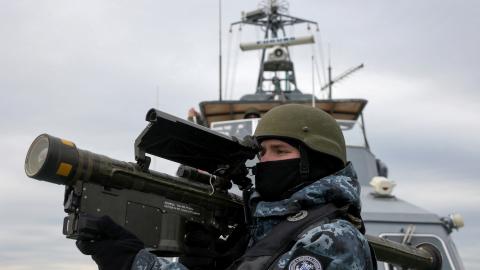Since 1991, successive U.S. administrations generally treated the Black Sea region (BSR) as peripheral to their relationship with Russia and other parts of Europe. This has finally changed for the better, but it took Putin’s full-scale invasion of Ukraine to jolt the Biden Administration into action. Putin’s war made Ukraine the centrepiece of the BSR, although all littoral states are very important. The future of the BSR will be decided in Ukraine.
The Obama Administration did not react robustly after Russia’s 2014 occupation of Crimea and Donbas. The Trump Administration supplied lethal kit and improved ties with Romania, Bulgaria, and Türkiye. The Biden Administration pursued mostly an Obama 2.0 policy until February 2022; since then, it has provided much support, but too little, too late.
After 2014, the U.S. Navy increasingly conducted FONOPs in the Black Sea until just before February 2022, in some years spending months on short deployments; this will presumably resume after the war ends. The 2022 NATO Summit focused more on the BSR and helped bring the disparity between the NE and SE sectors of the Eastern Flank closer to parity. Washington increased its military presence in Romania and Bulgaria.
The State Department’s Black Sea Strategy, which Assistant Secretary of State for European and Eurasian Affairs James O’Brien presented to Congress in October 2023, understood the fate of the BSR is inextricably linked to that of Ukraine and Europe. However, it could have been more ambitious. It described the situation well, but it was late, was not a whole-of-government effort, came with few additional resources, and offered no clear roadmap.
The December 2023 NDAA was an important step forward, stressing the U.S. interest in the BSR and recognizing it as an arena of Russian aggression. It described littoral states as contributors to NATO collective security, called Russian attempts to control access to the Mediterranean via the Black Sea a threat, noted the U.S. interest in strengthening economic ties with the BSR, and tasked a whole-of-government strategy in 2024.
Biggest opportunities? Economic. The BSR has enormous potential with its abundant resources, talented and enterprising people, attractive climate, and geopolitical location. Its energy resources are a potential game changer for European energy security. If Putin wins his war, however, these and other assets are unlikely to reach their full potential.
Biggest challenge? A Russian victory in Ukraine. The more Ukrainian territory Russia occupies when the war ends, and the closer it is to the Black Sea, the worse the outcome for those with interests there. A Black Sea that is whole, free, open, and at peace is critical for the survival of Ukraine and for the future of all littoral states. Russia has been doing the most damage in BSR countries in which the EU has declared a strong interest: Ukraine, the Republic of Moldova, and Georgia. A Putin victory would also negatively affect three NATO members and add another EEZ border, if unrecognized, with Russia. Romania has experienced Russian attacks on Ukrainian Danube targets; future spillovers could lead to Article 4 or even Article 5 cases at the NAC.
A Russian victory would further militarize the BSR, increase the likelihood of future conflict, expand Moscow’s malign influence, enable Putin to be a larger player in SE Europe and the Balkans, and enable his power projection beyond. He may conclude he can continue redrawing the map of Europe.
A Putin victory would have negative consequences for the biggest threat the Global West faces: China. CCP leaders are watching closely. If they see weakness and division, they will take this as a greener light to shape their alternative world order. Other dictators and fence-sitters will draw their conclusions. As Ukraine goes, so goes the BSR.















